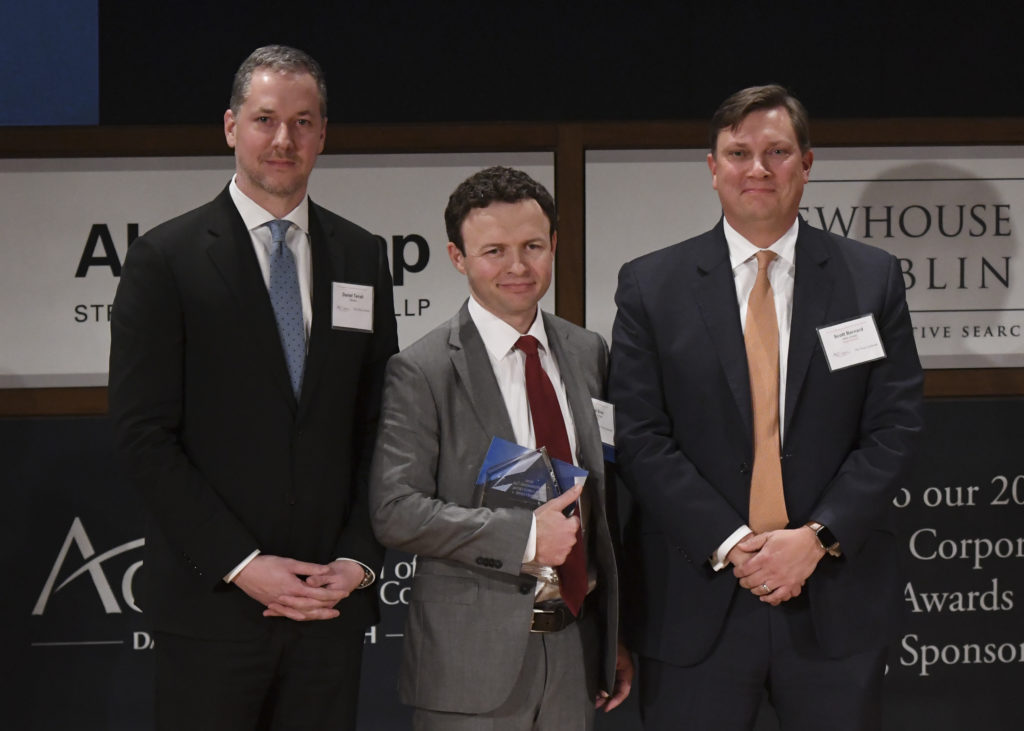
For Jared Sine 2020 has worked out pretty well.
Let that sink in for a moment. At precisely the time the rest of us are grappling with plague, economic uncertainty, political divisiveness and racial unrest, Jared Sine is thriving.
On June 12, the chief legal officer at Dallas-based Match (the proprietors of the dating site Match.com and oodles of others) settled what many were expecting to be a contentious IP lawsuit with Bumble, a competitor founded by a couple of former Match employees.
Two weeks later, on June 25, stockholders of Match and stockholders of its parent company IAC separately approved a complex reverse spin-off, making Match an independent company — an elegantly executed, tax-equitable transaction nine months in the making.
The company’s stock, which bottomed at $44 in March, bounced back to an $82 average in the ten days before the deal. This week it sits at about $93 per share.
“It’s been a good year,” says Sine over the telephone — with barely a hint of self-satisfaction.
Managing the spin-off of Match Group was nothing particularly novel for Sine. Since graduating from the J. Reuben Clark Law School at Brigham Young, Sine has focused most of his career on mergers and acquisitions: at Latham & Watkins in Southern California and later Expedia, where he helped managed the $3.9 billion acquisition of HomeAway, and the $1.6 billion purchase of Orbitz. Sine even taught M&A for a year at J. Reuben Clark.
Sine allows that the pressure was immense, but a different sort of pressure from deals he’d done in the past.
“At Expedia we handled a deal involving cash and stock and did it on the tightest of timelines — 45 days. But this took the cake,” Sine says.
“It was super-complicated and required a ton of thought. There were a million details, multiple S4 registering — all to end up with a whole new entity.”
The deal essentially began in October with the recognition that Match had reached a maturation point with markets and opportunities that made it unique within the structure of IAC. A special committee was created to plan and execute a spin-off.
“From that point it was kinda ‘game on’,” says Sine.
From the Dec. 19 announcement to its June 25 completion, there were the usual time pressures, detailed tasks and disruptions. And in March, as the coronavirus hit full force, the potential for disaster seemed ominous. The pandemic swamped the company’s global markets, bringing the world economy to a standstill.
But working long distance between Dallas and New York wasn’t a particular problem, Sine said. Nor was the sudden tumble in stock prices. Rather the real uncertainty was the effect of isolation on the nature of the business itself. Facial covering and social distancing suddenly became the norm for products built on dating and online first impressions.
“I think everybody took a big tumble,” Sine says. “Everyone felt uncertain about how their customers would respond to the lock-down. Would people just read books and watch movies all day? Or would they continue to interact? It turns out being on the internet is one thing, but if you’re an online user it’s a pretty important distinction.”
At inflection points like these, Sine says, the importance of information is key for transactional lawyers.
“When people are going into this lockdown situation, we have to make sure that we are charting the trends. What does this mean for the psyche of our customers? What will happen when they aren’t really meeting in person? All those were unanswered questions.”
And like every deal, Sine says, you have to constantly monitor yourself as well.
“I think the most difficult part is making sure that you’re getting the most dependable information. As a lawyer, you have to make sure that you’re managing appropriately: using the proper protocols, giving the proper advice, constantly asking yourself: ‘Does the deal still make sense?'”
But whatever the effects of isolation, it had little effect on the deal. Match Group apps managed to maintain their rather constant 9 million users. Company stock quickly rebounded from a low of $44 on March 20 to close at $62 five days later, holding steady between $80-$90 as the deal moved to close in June.

Any deal needs hard work and good fortune. Great deals require an abundance of both. But it is the structure of this deal itself that seems to give Sine particular satisfaction. To work as intended, securities laws required a high-level of control for both sides. Stockholders needed to understand what was happening and how it was happening. And to that end the proxy filings and explanations of the deal were complicated in their purpose, but elegant in their simplicity, like a piece of particularly inventive computer code.
Sine does not object to the comparison. “At Expedia I was working once with a friend of mine from GoDaddy. We were trying to describe complicated functions we’d mapped out on our website. At one point he told me: ‘You write your legal documents the way I write code.'”
A reverse spin-off — a transaction where the subsidiary acts as though it is the parent company — is designed to help minimize the tax consequences of the subsequent exchanges. It’s a move that makes sense when the subsidiary is a runaway success.
And by any measure Match is a runaway success. Barry Diller’s IAC —a pioneer in digital interactive retailing with brands like Vimeo, HomeAdvisor and Angie’s List — has separated lots of businesses in its 25 years. But with a market cap of $30 billion Match was by far the biggest.
By the time of the spin-off Match had more than 40 branded apps in 40 different languages being used to find relationships and hook-ups in 190 countries across the globe.
Its product line reads like a Who’s Who of focused online dating: Match, OkCupid, OurTime, PlentyofFish, BlackPeopleMeet, neu.de, Hawaya. Tinder, a starburst within Match Group’s starburst, is the largest-grossing non-game app in the world.
Thus, from the first meetings of a special committee in October to explore the potential transaction, Sine sought out and worked steadily with some of the best practitioners in the business: from Wachtel, Davis Polk, Goldman Sachs and Debevoise & Plimpton.
“We chose the firms we chose because of the reality of the structure we decided on; what was basically the reverse spin-off transaction,” Sine said. “There haven’t been a lot of these done.”
IAC chose Wachtell, Lipton, Rosen & Katz. The special committee was advised by Jeffrey Rosen of Debevoise & Plimpton. And Match Group reached out to Richard Truesdell, considered one of the most influential M&A advisors in the world. More to the point, both Rosen and Truesdell had some history with reverse spin-offs and could help guide Match, IAC and, particularly, Sine through the organizational intricacies of the myriad tasks associated with such a complicated deal.
The final product proved not only tax-equitable but stockholder-friendly, with special attention given to the generation of enthusiastic stockholder approval.
The object was to separate Match and its subsidiaries from IAC and its remaining subsidiaries by turning IAC, essentially, into Match. Here’s how it worked.
First, stockholders of IAC were made stockholders in two separate entities: IAC, which would own Match and its businesses along with some financing entities (which would become “Match Group, Inc.”) and New IAC (which would become “IAC/InteractiveCorp”). Stockholders in Match became stockholders in Match Group, Inc.
Match Group stockholders received “one share, one vote” common stock. Simple transaction. But for IAC stockholders: not so much.
Existing IAC shareholders received share-for-share exchanges in IAC/InterActive, both for common stock and Class B common stock. To compensate for the separation of Match from IAC, they would receive shares of a new “Class M” common stock, whose value would be calculated by the value of the assets retained by the new Match Group, divided by the shares of outstanding stock in IAC at the time of the transaction.
Shareholders in Match, on the other hand, were compensated for stockholder approval with their choice of $3 per share in cash, or additional fractional stock of equal value.
The result has been everything hoped for. Match has greater corporate flexibility and a measure of freedom from the regulatory complications of a far-flung corporate structure like IAC.
Sine says that he is most proud of his team and says they deserve all the actual credit.
“They’re a well-oiled machine doing the work of departments many times their size. I am so fortunate to have such an amazing team with such talented and good people,” Sine says.
Personally, Sine is finding himself busy working on “the next thing.” And that role is pretty simple, Sine says.
“Now we have a public company and clearly our job is to go out and keep doing well,” Sine says.
“The arc of the transaction has been an interesting ride.”
